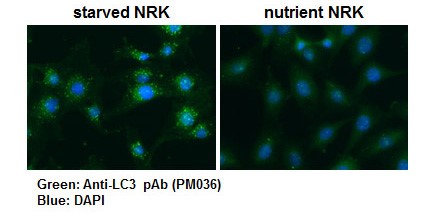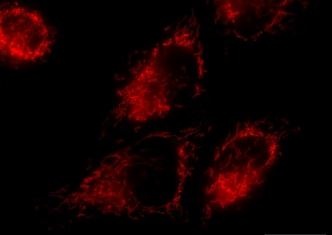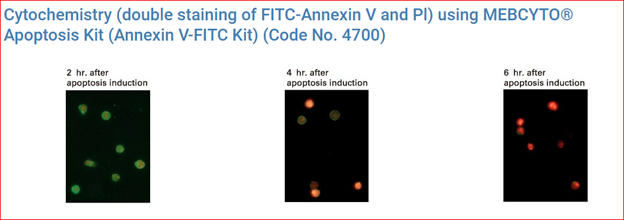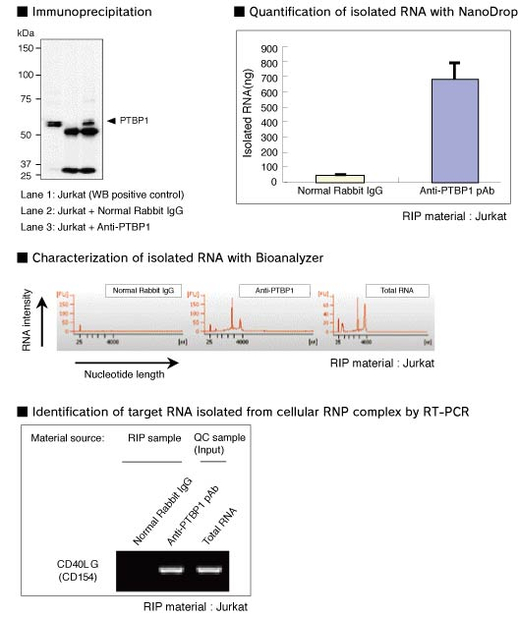Published by Beata Boczkowska, Ph.D. on Dec 19, 2022 1:23:09 PM

MBLI is proud to continuously provide high quality research reagents to the biological community, which has led to numerous publications and scientific advances throughout the year. Please contact us if you do not see your specific product of interest.
This newsletter highlights some of the 2022 publications for select research topics.
Content of Newsletter
1. Organoid culture
2. Autophagy
3. Mitophagy
4. Apoptosis
5. Epigenetics
1. ORGANOID CULTURE
Organoid culture is a 3-dimentional culture method that enables the recapitulation of the tumor microenvironment and the success rate reported is higher than the 2-dimentional culture.
Organoid Culture Product Highlight
J2-001
Afamin/Wnt3a CM serum free conditioned medium including Wnt3a-Afamin complex for intestinal organoid cell culture. 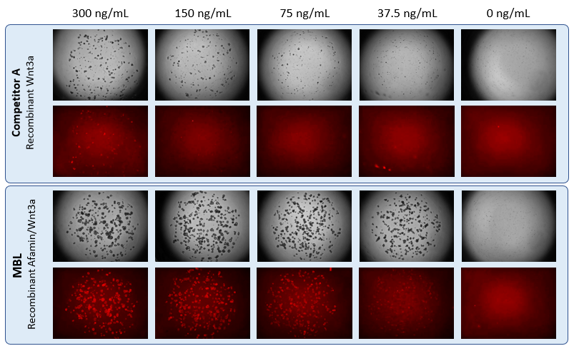
References:
- Li, Youxian, et al. "Identification of trypsin-degrading commensals in the large intestine." Nature 609.7927 (2022): 582-589.
- Ryosaka, Makoto, Shin-Ichi Mae, and Kenji Osafune. "Protocol for the generation and expansion of human iPS cell-derived ureteric bud organoids." STAR protocols 3.3 (2022): 101484.
- Honda, Kenya, et al. "Identification of commensals and molecular components mediating trypsin degradation in the large intestine." (2022)
- K. Ikezawa, et al., Establishment of organoids using residual samples from saline flushes during endoscopic ultrasound-guided fine-needle aspiration in patients with pancreatic cancer., Endosc Int Open 10 (2022)
- K. Toshimitsu, et al., Organoid screening reveals epigenetic vulnerabilities in human colorectal cancer., Nat Chem Biol 18 (2022)
- Z. Wang, et al., Lactate promotes the growth of patient-derived organoids from hepatopancreatobiliary cancers via ENO1/HIF1α pathway and does not affect their drug sensitivities., Cell Death Discov 8 (2022)
- Cao, Chuanzhen, et al. "Phenotypical screening on metastatic PRCC-TFE3 fusion translocation renal cell carcinoma organoids reveals potential therapeutic agents." Clinical and Translational Oncology (2022): 1-14.
- Demyan, Lyudmyla, et al. "Pancreatic Cancer Patient-derived Organoids Can Predict Response to Neoadjuvant Chemotherapy." Annals of Surgery 276.3 (2022): 450-462.
- Toshimitsu, Kohta, et al. "Organoid screening reveals epigenetic vulnerabilities in human colorectal cancer." Nature Chemical Biology 18.6 (2022): 605-614.
- Nelson, Jessica K., et al. "USP25 promotes pathological HIF-1-driven metabolic reprogramming and is a potential therapeutic target in pancreatic cancer." Nature communications 13.1 (2022): 1-18.
2. AUTOPHAGY
Autophagy is a cellular self-digestion process for the purpose of providing nutrients to allow for cell survival during stress conditions. Autophagy can be selective (mitophagy) or non-selective (nutrient poor). Autophagy plays an important role in maintaining the cell homeostasis by removing non-essential cell components. The role of autophagy is generally understood to be securing nutrient sources through autodigestion to survive starvation conditions. However, in recent years, it has been found to work along with the proteasome system in the metabolism of cell components even in normal environments. Compared to proteasomes, which selectively degrade ubiquitinated proteins as their targets, in autophagy the space within the cell is entirely digested; therefore, it is called a bulk degradation system. Recent research and advances have shown an association of mammalian autophagy with diseases such as neurodegenerative disease, infection disease, cardiac disease as well as cancers.
Autophagy Product Highlights
1. PM045: Anti-p62 (SQSTM1) (Human) pAb (Polyclonal Antibody)
2. PM036: Anti-LC3 pAb (Polyclonal Antibody)
3. CY-7055: Total p62 ELISA Kit
p62/SQSTM1 interacts with various molecular groups such as RIP, TRAF6, ERK, aPKCs, and poly-ubiquitin through PB1 domain, Zn finger domain, and UBA domain. This protein directly interacts with LC3, which is localized on autophagosome membrane, and is degraded by autophagic-lysosome pathway. p62 regulates ubiquitin-positive protein aggregates caused by autophagy deficiency.
PM045: Anti-p62 (SQSTM1) (Human) pAb (Polyclonal Antibody)
This antibody was purified from rabbit serum using affinity column. The rabbit was immunized with the recombinant human p62 protein corresponding to amino acids (120-440).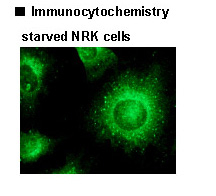
PM045 References:
- Dahmane, S., Kerviel, A., Morado, D.R. et al. Membrane-assisted assembly and selective secretory autophagy of enteroviruses. Nat Commun 13, 5986 (2022).
- Cocco, Stefania, et al. "Inhibition of autophagy by chloroquine prevents resistance to PI3K/AKT inhibitors and potentiates their antitumor effect in combination with paclitaxel in triple negative breast cancer models." Journal of Translational Medicine 20.1 (2022): 1-17.
- Molero-Valenzuela, Adrià, et al. "A Novel Late-Stage Autophagy Inhibitor That Efficiently Targets Lysosomes Inducing Potent Cytotoxic and Sensitizing Effects in Lung Cancer." Cancers 14.14 (2022): 3387.
- Mawed, Suzan Attia, et al. "atg7 and beclin1 are essential for energy metabolism and survival during the larval-to-juvenile transition stage of zebrafish." Aquaculture and Fisheries 7.4 (2022): 359-372.
- Ono, Maiko, et al. "Central role for p62/SQSTM1 in the elimination of toxic tau species in a mouse model of tauopathy." Aging Cell (2022): e13615.
PM036: Anti-LC3 pAb (Polyclonal Antibody)
This antibody was purified from rabbit serum using protein A agarose. The rabbit was immunized with the recombinant human LC3 [MAP1LC3B (1-120 aa).
- Wu, Z., Xu, Z., Zhou, X. et al. sGRP78 enhances selective autophagy of monomeric TLR4 to regulate myeloid cell death. Cell Death Dis 13, 587 (2022).
- Yu, F., Zhang, Q., Liu, H. et al. Dynamic O-GlcNAcylation coordinates ferritinophagy and mitophagy to activate ferroptosis. Cell Discov 8, 40 (2022).
- Zhou, D., Borsa, M., Puleston, D.J. et al. Mapping autophagosome contents identifies interleukin-7 receptor-α as a key cargo modulating CD4+ T cell proliferation. Nat Commun 13, 5174 (2022).
CY-7055 CycLex® Total p62 ELISA Kit
Total p62 ELISA Kit is used for the quantitative measurement of human or mouse p62 protein in cell lysate.
CY-7055 Reference:
- Ma, Eun Bi, et al. "Gasdermin D Deficiency Does Not Protect Mice from High-Fat Diet-Induced Glucose Intolerance and Adipose Tissue Inflammation." Mediators of Inflammation 2022 (2022).
3. MITOPHAGY
Mitophagy is the selective degradation of old or depolarized mitochondria by autophagy and contributes to maintaining a healthy population of mitochondria. Since damaged mitochondria lead to collapse cell homoeostasis, mitophagy is believed to be protective against diseases related to mitochondrial dysfunction such as in neurodegenerative disorders.
Mitophagy Product Highlight:
AM-V0259M: pMitophagy Keima-Red mPark2 (Kan)
Mitophagy detection vectors are designed for the co-expression of MT-mKeima-Red. (CoralHue®Mitochondria-targeted monomeric Keima-Red) gene and mouse Parkin (mPark2) gene from the internal ribosome entry site (IRES), as part of a bicistronic transcript in mammalian cells. Keima-Red has been cloned from Montipara sp. A monomeric version of CoralHue®Keima-Red (mKeima-Red) displays a bimodal excitation spectrum with peaks at 440 and 586nm in neutral and acidic solutions, respectively, and an emission maximum at 620nm. Mitochondrial targeting of mKeima-Red is achieved by introducing a mitochondrial signal sequence at the N-terminus of mKeima-Red.
References:
- Ma, Cui, et al. “Ubiquitinated AIF Is a Major Mediator of Hypoxia-Induced Mitochondrial Dysfunction and Pulmonary Artery Smooth Muscle Cell Proliferation.” Cell & Bioscience, vol. 12, no. 1, 2022, doi:10.1186/s13578-022-00744-3
- Ke, Po-Yuan, Chih-Wei Chang, and Yuan-Chao Hsiao. "Baicalein Activates Parkin-Dependent Mitophagy through NDP52 and OPTN." Cells 11.7 (2022): 1132.
4. APOPTOSIS
Apoptosis, a form of programmed cell death, is not only a major process within normal homeostasis but is present in disease states such as cancer and many autoimmune and neurodegenerative diseases. Apoptosis is accompanied by condensation of cytoplasm, loss of plasma membrane microvilli, condensation and fragmentation of nuclei, and extensive degradation of chromosomal DNA into oligomers of about 180 bp. A large number of molecules are involved in carrying out and regulating apoptosis.
Apoptosis Product Highlight:
4700 MEBCYTO® Apoptosis Kit (Annexin V-FITC Kit)
The MEBCYTO® Apoptosis Kit (Annexin V-FITC Kit) (4700) can identify cells in an earlier stage of apoptosis.
References:
- Owari, Takuya, et al. "5-Aminolevulinic acid overcomes hypoxia-induced radiation resistance by enhancing mitochondrial reactive oxygen species production in prostate cancer cells." British Journal of Cancer (2022): 1-14.
- Minato, Tomomi, et al. "β-Aminoisobutyric acid, L-BAIBA, protects PC12 cells from hydrogen peroxide-induced oxidative stress and apoptosis via activation of the AMPK and PI3K/Akt pathway." IBRO Neuroscience Reports 12 (2022): 65-72.
- Erdogan, Cihan Suleyman, et al. "Combinatorial effects of melatonin and paclitaxel differ depending on the treatment scheme in colorectal cancer in vitro." Life Sciences (2022): 120927.
- SHIMIZU, So, et al. "Aberrant upregulation of the endogenous PP2A inhibitor CIP2A is vital for myeloma cell growth and survival." International Journal of Myeloma 12.2 (2022): 14-23.
- LI, HIROMI, et al. "Administration of Gapmer-type Antisense Oligonucleotides Targeting γ-Glutamylcyclotransferase Suppresses the Growth of A549 Lung Cancer Xenografts." Anticancer Research 42.3 (2022): 1221-1227.
- Owari, Takuya, et al. "5-Aminolevulinic acid overcomes hypoxia-induced radiation resistance by enhancing mitochondrial reactive oxygen species production in prostate cancer cells." British Journal of Cancer (2022): 1-14.
- Ben-Mordechai, Tamar, et al. "Ablation of CX3CR1-expressing Immune Cells after Radiation Attenuates Tumor Progression and Sensitizes Cancer Cells to S-phase Specific Chemotherapy." (2022).
- Tran, Phuong Xuan, et al. "Potential for reversing miR-634-mediated cytoprotective processes to improve efficacy of chemotherapy against oral squamous cell carcinoma." Molecular Therapy-Oncolytics 24 (2022): 897-908.
- Moyama, Chiami, et al. "Stat5b inhibition blocks proliferation and tumorigenicity of glioblastoma stem cells derived from a de novo murine brain cancer model." American journal of cancer research 12.3 (2022): 1129.
- Takagi, Hiroko, et al. "Fluorizoline Blocks the Interaction between Prohibitin-2 and γ-Glutamylcyclotransferase and Induces p21Waf1/Cip1 Expression in MCF7 Breast Cancer Cells." Molecular Pharmacology 101.2 (2022): 78-86.
- Shai, Ayelet, et al. "Inhibiting mutant KRAS G12D gene expression using novel peptide nucleic acid based antisense: A potential new drug candidate for pancreatic cancer." Oncology Letters 23.4 (2022): 1-11.
- Nakamura, Keiichiro, et al. "ADAR1 and AZIN1 RNA editing function as an oncogene and contributes to immortalization in endometrial cancer." Gynecologic Oncology 166.2 (2022): 326-333.
- Wirawan, Aditya, et al. "A Novel Therapeutic Strategy Targeting the Mesenchymal Phenotype of Malignant Pleural Mesothelioma by Suppressing LSD1Suppressing LSD1 to Target Mesenchymal Phenotype in MPM." Molecular Cancer Research 20.1 (2022): 127-138.
5. EPIGENETICS
The epigenetics field continues to gain significance as we discover there are more causes to DNA mutations outside of hereditary contribution. Gene expression that is turned on/ off due to external factors, such as environment or diet, continue to draw researchers to discover exactly how these genes become altered.
Product Highlight:
RIP-Assay Kit is optimized for performing the RIP-Chip process. In the RIP-Assay protocol, mRNP complexes are isolated from cell extracts by immunoprecipitation with RIP-Certified Anti-RBP Antibodies provided from MBL. mRNAs are isolated from mRNPs using guanidine hydrochloride. Thus, RIP-Assay Kit does not contain phenol or chloroform, allowing safe isolation of “high-quality RNA” from RNP complexes without degradation. Once purified, the RNAs present in the complex are analyzed to identify the target mRNAs using various molecular biology tools such as RT-PCR, gene expression analysis based on microarray technology (Chip analysis), or sequencing.
References:
- Han, Wei, et al. "Targeting HOTAIRM1 ameliorates glioblastoma by disrupting mitochondrial oxidative phosphorylation and serine metabolism." Iscience 25.8 (2022): 104823.
- Zhuang, Zhijiang, Lihong Zhang, and Chongchong Liu. "SNHG14 Upregulation Was a Molecular Mechanism Underlying MPP+ Neurotoxicity in Dopaminergic SK-N-SH Cells via SNHG14-miR-519a-3p-ATG10 ceRNA Pathway." Neurotoxicity Research 40.2 (2022): 553-563.
- Liu, Tao, et al. "Circ_0060, 144 inhibits the occurrence and development of age-related cataract via the miR-23b-3p/HIPK3 axis." Experimental Eye Research 222 (2022): 109179.
- Hu, Chenchen, et al. "HPV E6/E7 promotes aerobic glycolysis in cervical cancer by regulating IGF2BP2 to stabilize m6A-MYC expression." International journal of biological sciences 18.2 (2022): 507.
- Tang, Yaqin, et al. "YB1 dephosphorylation attenuates atherosclerosis by promoting CCL2 mRNA decay." Frontiers in cardiovascular medicine 9 (2022)
- Sperling, Florian, et al. "IGF2BP1 Promotes Proliferation of Neuroendocrine Neoplasms by Post-Transcriptional Enhancement of EZH2." Cancers 14.9 (2022): 2121.
- Yang, Ronghui, et al. "Downregulation of nc886 contributes to prostate cancer cell invasion and TGFβ1-induced EMT." Genes & Diseases 9.4 (2022): 1086-1098
Visit mblintl.com to explore all of our products
